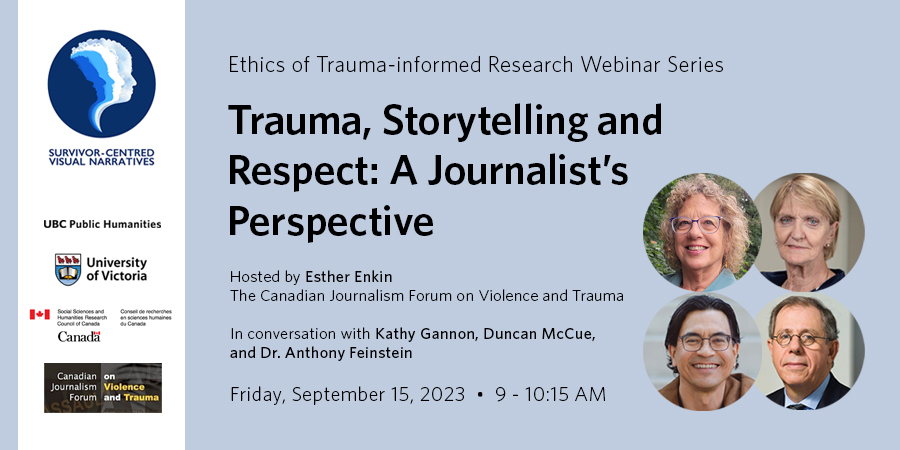Journalists strive to report traumatic stories in the public interest, without exploitation or harm to their subjects or themselves. This webinar brings together a panel of experts to discuss the evolving nature of trauma-informed journalism and practices that can help other kinds of storytellers, such as visual artists and human rights advocates, hoping to cast new light without deepening psychological shadows.
Friday, September 15, 2023
9:00 – 10:15 am Pacific Time
Online via Zoom
Registration:
https://publichumanities.ubc.ca/events/event/trauma-storytelling-and-respect/
This webinar is part of the Ethics of Trauma-Informed Research Webinar Mini-Series co-hosted by the University of Victoria’s Visual Storytelling and Graphic Art in Genocide and Human Rights Education project and the UBC-V Public Humanities Hub.
Special thanks to Jane Hawkes and Esther Enkin for organizing this event and gathering such an exceptional group of speakers!
Speaker Bios
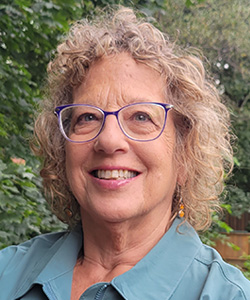
Esther Enkin was CBC Ombudsperson for six years. She also was a guest lecturer at journalism schools and a speaker at international fora about ethics, accountability, trust, and the impact of social media on journalism and journalism ethics. Before becoming Ombudsman, Esther led a comprehensive update of CBC’s Journalistic Standards and Practices including new provisions for digital publishing and social media. In her role as Executive Editor of CBC News, she oversaw standard and practice on a daily basis.
She was one of the founding producers of The Journal and her documentaries won several international awards. While most of her career was in broadcasting, she got her start in the business as a summer student at the Ottawa Citizen.
She is past president of the Organization of News Ombudsmen and Standard Editors, an international group with members on every continent (except Antarctica!). The news ombudsmen, reader’s representatives and standards editors of some of the world’s best media organizations come together to act to protect and enhance the practice of journalism.
Through her involvement with the Canadian Journalism Forum on Violence and Trauma, she was one of the creators of Mindset, a guide to mental health reporting for journalists. The Guide is used in many newsrooms and is a resource in schools of journalism across Canada. She developed and delivers training to journalists across Canada on the coverage of mental health issues and the reporting of suicide. She is also Vice-President of the Forum.
She is the author of a chapter on Ombudsmen in a recently published work, Global Journalism Ethics.
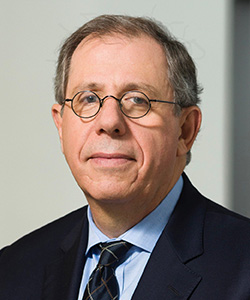
Dr. Anthony Feinstein is a professor of Psychiatry at the University of Toronto and past Chair of the Medical Advisory Committee of the MS Society of Canada. His MS research has focused on determining cerebral correlates of depression and disorders of affect, the use of computers and distracters in eliciting cognitive dysfunction, and the behavioral effects of cannabis and the mechanisms underlying these behaviours. He is currently lead investigator on the CogEx trail, a six-country study determining the efficacy of treating cognitive impairment in people with progressive MS using high intensity aerobic exercise and cognitive rehabilitation. In 2023, he was honored with a “Giants of MS” award from the Consortium of MS Centres and Neurology Live.
A second strand to his research relates to the study of journalists in conflict situations. He has published a series of seminal studies exploring the psychological effects of conflict on journalists covering the Balkans, Iraq, Mexico, Syria, Kenya, Iran, Afghanistan, the refugee crisis in Europe and the aftermath of the 9/11 attack on New York City. He currently consults to a number of news organizations including The Globe and Mail, CNN, The New York Times and Agence France-Presse.
Dr. Feinstein is the author of In Conflict (New Namibia Books, 1998), Dangerous Lives: War and the Men and Women Who Report It (Thomas Allen, Toronto 2003), The Clinical Neuropsychiatry of Multiple Sclerosis (Cambridge University Press 1999, with a second edition in 2007), Michael Rabin, America’s Virtuoso Violinist (Amadeus Press, 2005, second edition, 2011; audiobook, 2017), Journalists Under Fire: the Psychological Hazards of Covering War (John Hopkins University Press, 2006), Battle Scarred (Tafelberg Press, 2011), Shooting War (Glitterati Editions, 2018) and Mind, Mood and Memory in Multiple Sclerosis (Johns Hopkins University Press, 2022). His latest book, Moral Courage (Glitterati Editions), is due out in the fall of 2023. He has published widely in peer-reviewed journals and has authored many book chapters.
In 2000-2001 he was awarded a Guggenheim Fellowship to study mental health issues in post-apartheid Namibia. In 2012, he produced a documentary, “Under Fire”, based on his research of journalists in war zones. It was longlisted for an Academy Award and won a Peabody Award.
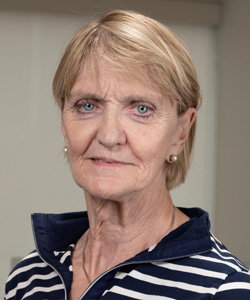
Kathy Gannon was the Fall 2022 Joan Shorenstein Fellow at the Shorenstein Center, Harvard Kennedy School. She served as The Associated Press news director for Pakistan and Afghanistan. She has authored I is for Infidel and has a second book in progress.
She has covered the region for the AP as a correspondent and bureau chief since 1988, a period that spans the withdrawal of Russian soldiers from Afghanistan, the assassination of Benazir Bhutto, the bitter Afghan civil war between Islamic factions and the rise and fall of the Taliban. Gannon was the only Western journalist allowed in Kabul by the Taliban in the weeks preceding the 2001 U.S.-British offensive in Afghanistan.
In addition to her coverage of South Central Asia, she has covered the Middle East, including the 2006 Israeli war against Hezbollah in southern Lebanon, and war in northern Iraq.
In April 2014 Gannon was seriously wounded – hit by seven bullets – while covering preparations for Afghan national elections when an Afghan police officer opened fire on the car in which she was riding. Her colleague and close friend, AP photographer Anja Niedringhaus, was killed in the attack.
She underwent 18 surgeries and returned to Afghanistan and Pakistan where she has explored sexual abuse in Islamic madrassas, took a deep dive into honor killings, that kill more than a thousand women in each year at the hands of their family members, followed Taliban’s sweep through Afghanistan, Parliamentary and again was in Afghanistan to cover another presidential election, this one in 2019.
A native of Timmins, Ontario, she was the city editor at the Kelowna Courier in British Columbia and worked at several Canadian newspapers before her career took her overseas. She has lived in Israel, Japan, Pakistan and Afghanistan.
She has received two honorary doctorates from Northern Canada universities and is the recipient of numerous awards, including:
- Columbia School of Journalism Lifetime Award 2022
- The American Academy of Diplomacy 2021 Arthur Ross Media Award
- International Women’s Media Foundation Courage In Journalism Award
- Overseas Press Club Award for best newspaper or wire service reporting from abroad
- Committee to Protect Journalists Burton Benjamin Memorial Award
- John Peter and Anna Catherine Zenger Freedom of the Press Award from the University of Arizona School of Journalism
- Grady College McGill Medal for Journalistic Courage from the University of Georgia
- James Foley Medill Medal for Courage in Journalism from Northwestern University’s Medill School of Journalism, Media, Integrated Marketing Communications
- Canadian Journalists for Free Expression Tara Singh Hayer Memorial Award
- Edward R. Murrow Fellow, Council on Foreign Relations
- National Newspaper Awards Governors’ Award
- AP Oliver S. Gramling Award in Journalism
The Coalition for Women in Journalism (CFWIJ) in February 2023 launched an annual award in her name, The Kathy Gannon Legacy Award, recognizing trailblazing journalism as well as decades of mentoring women journalists.
In 2005 Gannon authored “I is for Infidel: From Holy War, to Holy Terror, 18 Years Inside Afghanistan,” an examination of the Taliban and post-Taliban period, published by Public Affairs.
Gannon is married to respected Pakistani architect Naeem Pasha, and has a stepdaughter, Kyla Pasha. She is the youngest of six children. Her brothers Brian and Lorne were also journalists, her brothers Robert and Terry were prominent in their fields and her sister, Patricia Ann, was a nurse in Canada’s north for 40 years.
Her website with her latest stories and personal information is www.kathy-gannon.com.
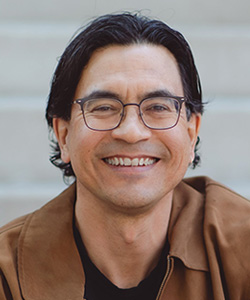
Duncan McCue, an award-winning CBC broadcaster and leading advocate for fostering the connection between journalism and Indigenous communities, joined Carleton University’s School of Journalism and Communication on July 1, 2023.
McCue took up a new tenure track position as an Associate Professor, specializing in Indigenous Journalism and (Story)telling. In addition, McCue is working with Carleton colleagues to launch a new journalism skills certificate on the ground in Indigenous communities. McCue was the host of Helluva Story on CBC Radio and was also the driving force behind Kuper Island, a remarkable eight-part podcast series on residential schools.
McCue was with CBC News for 25 years. In addition to hosting CBC Radio One’s Cross Country Checkup, he was a longstanding correspondent for CBC-TV’s flagship news show, The National. McCue will continue to maintain an association with CBC after he joins Carleton. McCue comes to Carleton with extensive experience as an educator, having taught journalism and created courses at the UBC Graduate School of Journalism and Toronto Metropolitan University and also as a visiting fellow at Carleton.
Over the years he developed a unique online resource, Reporting in Indigenous Communities, which inspired his latest work, a new textbook called Decolonizing Journalism: A Guide to Reporting in Indigenous Communities. McCue is also the author of The Shoe Boy: A Trapline Memoir, which recounts a season he spent in a hunting camp with a Cree family in northern Quebec as a teenager. McCue studied English at the University of King’s College, then did his law degree at UBC. He was called to the bar in British Columbia in 1998. McCue is Anishinaab.

